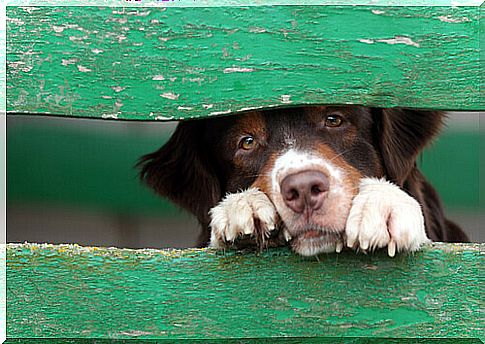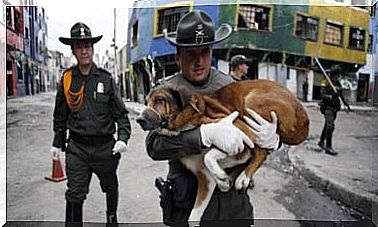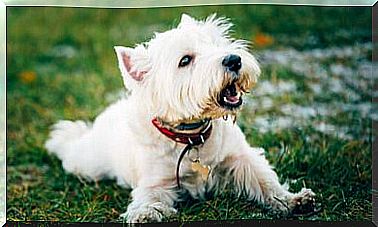Fearful Dogs

Quite often it is easy to meet fearful or even shy dogs . The first thing to do in these cases is to try to understand what they are afraid of, in order to better understand what their reactions depend on.
Why are dogs afraid?
One of the causes may be their innate shyness, but dogs also experience an atavistic fear, so to speak, when they hear certain types of noises, especially sirens and fireworks. This type of fearful reaction in response to particularly loud noises is dictated by the survival instinct , which these animals have inherited from the wolves, from which they are descended. Wolves, in fact, when they tried to eat the cattle of men, were hunted by the latter, who thus tried to defend their main source of livelihood.

Wolf hunting, therefore, created in these animals, and in their future descendants, a natural fear of all those noises that resemble a shot. However, this is not the only noise that can frighten them. They can also be afraid in other circumstances:
- Fear of people: especially in the case of strangers, both on the street and when it comes to a home visit.
- Fear of water: whether it’s shower, pool or sea, your friend is very likely to be quite reluctant to bathe.
- Fear of the vet: Just as we don’t like going to the dentist or the doctor, our four-legged friends are also fearful when they have to go to the vet.
- Loud noises: not only fireworks, but also the noise of a falling container or an appliance being put into operation, or even the sound of the toilet flushing can frighten dogs.
In most of these cases, it is not so natural for the dog to be afraid: the fact that the dog shows fear in the presence of strangers, for example, may be due to a socialization deficit. In other circumstances, however, fear can depend on trauma, as well as on excessive protection or, on the contrary, on the owner’s neglect towards his furry friend.
The reactions of fearful dogs
The reactions of dogs to fear are not all the same and it is not yet clear whether a particular fear corresponds to a certain reaction or if it is rather a generalized response, common to all fears. However, the most common reactions in fearful dogs are the following:
- Attempt to escape. If your four-legged friend starts running wild every time he meets a stranger or a situation like the ones mentioned above arises, you will need to try to identify the causes of this behavior and treat them.
- Defecation and urination. Faced with fear, the animal freezes and its body is unable to control certain reflex actions, such as physiological needs.
- Desperate search for a hiding place.

- Tremors. Just like humans, shivering is one of the most characteristic signs of fear for dogs.
- Bark or grunt at what generates fear.
- Attempt to aggression in case you try to tackle the animal.
- Ears pulled back and tail between legs.
Fear is not a good feeling for anyone, including dogs, and if it is not treated in time, it can lead to phobia, a much more difficult condition to eradicate. Fortunately, dealing with these fears is possible and not too difficult. Let’s see how.
How to deal with fears in dogs
It is said that the best defense is attack, and it’s true: when you adopt a dog, you have to attack the fears even before they appear. From an early age therefore, you will have to try to:
- Socialize it: Teach your four-legged friend to be with other people and other animals. Let the children play with him and get him used to being surrounded by people and animals that are not part of his family.
- Get used to the noise. When he is a puppy, do not try to be quiet at all costs, so as not to disturb him while he sleeps, because doing so will make his hearing much more sensitive and he will be much more likely to become a dog that is frightened at the slightest noise.
- Choose a caring vet. Look for a vet who is affectionate, who caresses your dog often and who knows how to reward him when the time comes: in this way your furry friend will connect the visit to the vet with a pleasant and rewarding time.
Sometimes, however, despite everything, it seems impossible to eliminate the fears of your furry friend at the root, even though you have lived together for years: we do not want to promise anything, but our advice, in the most stubborn cases, is to contact a specialist. Ask your veterinarian for advice, he will certainly be able to help you about what to do: when fear has accompanied your pet for too many years, in fact, it turns into a phobia that you cannot face alone.
Images courtesy of Toshihiro Gamo.









